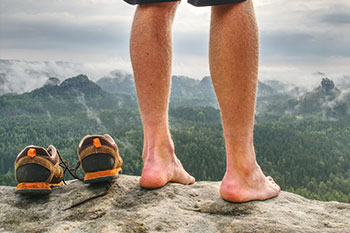
Going Barefoot? Beware!
TIPS FOR A SAFER BAREFOOT SUMMER
Millions of Americans will go barefoot this summer, and thousands will suffer injuries such as cuts and puncture wounds. Some will develop nasty infections that may require surgery.
The best way to protect feet and toes from injury is to wear shoes. But if your summer just wouldn’t be the same without the sand between your toes or walking in your backyard barefoot, doctors with the American College of Foot and Ankle Surgeons (ACFAS) say you can make it a safer season by following these tips:
Tip: See a foot and ankle surgeon within 24 hours for a puncture wound.
Why: These injuries can embed unsterile foreign objects deep inside the foot. A puncture wound must be cleaned properly and monitored throughout the healing process. This will help to avoid complications, such as tissue and bone infections or damage to tendons and muscles in the foot. Foot and ankle surgeons are trained to properly care for these injuries.
Tip: Make sure you’ve been vaccinated against tetanus. Experts recommend teens and adults get a booster shot every 10 years.
Why: Cuts and puncture wounds from sharp objects can lead to infections and illnesses such as tetanus.
Tip: Apply sunscreen to the tops and bottoms of your feet.
Why: Feet get sunburn too. According to FootHealthFacts.org, rare but deadly skin cancers can develop on the feet.
Tip: Inspect your feet and your children’s feet on a routine basis for skin problems such as warts, calluses, ingrown toenails and suspicious moles, spots or freckles.
Why: The earlier a skin condition is detected, the easier it is for your foot and ankle surgeon to treat it.
Tip: Wear flip-flops or sandals around swimming pools, locker rooms and beaches.
Why: To avoid cuts and abrasions from rough anti-slip surfaces and sharp objects hidden beneath sandy beaches, and to prevent contact with bacteria and viruses that can cause athlete’s foot, plantar warts, and other problems.
Tip: Use common sense
Why: Every year, people lose toes while mowing the lawn barefoot. Others suffer serious burns from accidentally stepping on stray campfire coals or fireworks. Murky rivers, lakes and ponds can conceal sharp objects underwater. People with diabetes should never go barefoot, even indoors, because their nervous system may not “feel” an injury and their circulatory system will struggle to heal breaks in the skin.
